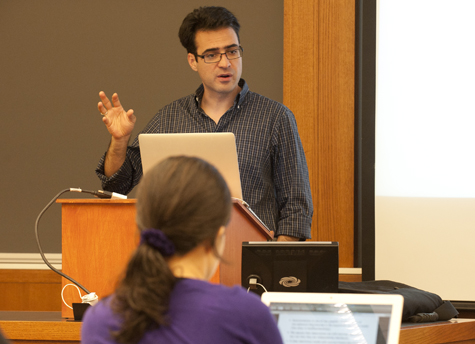
Social norms in Mexico City in the 1970s suggested that Guillermo Rosas would grow up and spend his entire life in his hometown.
Today, Rosas, PhD, associate professor of political science in Arts & Sciences, is grateful for enabling factors that pushed him to leave his native country and pursue a graduate degree in the United States.
Much of Rosas’ research hearkens back to his homeland as he strives to infuse careful political science analysis into the public dialogue. He has a strong desire to mold young Mexican scholars, returning there to teach mini-courses and lead conferences.
“Maybe it will bear fruit,” he says. “That’s my hope. In Mexico, public discourse is so ill-informed. It is not supported by carefully thought-out analysis.
“In assessing the effects of public policy, we can say, ‘A was caused by B,’ but how can we be certain of that?” he asks. “We have to make sure we take the right steps to reach conclusions and to inform public opinion about what consequences can be attributed to government action and which ones may not.
“As academicians, it’s our responsibility to provide informed research about topics of public interest.”
Specializing in comparative politics, political economy and Latin American politics, Rosas focuses on a variety of issues from banking crises to voting dynamics to drug-trafficking-related deaths.
“Professor Rosas is one of the best applied political methodologists in the world,” says Andrew Martin, PhD, professor and director of the Center for Empirical Research in the Law at the School of Law and professor of political science.
“Today, he is developing statistical models to solve problems unique to political science, including strategic abstention in legislatures and measuring the robustness of banks in Latin America over time,” Martin says.
Making a compelling case
One of his most important contributions is the 2009 book Curbing Bailouts: Bank Crises and Democratic Accountability in Comparative Perspective. Sparked by his personal knowledge of the 1994 economic crisis in Mexico, Rosas wanted to understand if democratic governments and authoritarian regimes responded to banking crises in the same way.
“It would be hard to imagine more timely work,” says Brian F. Crisp, PhD, associate professor of political science.
“He makes a compelling case for why democratic governments are constrained in their ability to pump resources into insolvent banks — constraints that don’t apply to regimes that are less responsive to a voting constituency.”
Nathan Jensen, PhD, associate professor of political science who has co-authored book chapters and journal articles with Rosas, says he has learned new research methods through the collaboration.
“Guillermo’s attention to detail, care in empirical analysis and ability to think creatively about complex problems is something I attempt to model in my own work,” Jensen says.
Curious and resourceful
Naturally curious, Rosas has worked hard to develop the statistical methods needed to examine complicated questions in a credible way.
Because he was interested in determining whether a nine-member, nonpartisan Mexican electoral management body truly was voting in a nonpartisan way, Rosas embraced tools of Bayesian statistical analysis to test the theory.
But Rosas’ education to that point had not included critical training in statistical methods. When Rosas first came to WUSTL as a visiting professor in 2003, he enrolled in courses alongside his students.
He credits Martin and Jeff Gill, PhD, professor of political science, for helping him take his work to the next level.
“To be clear, Professor Rosas wrote an excellent dissertation and was very active with research,” Martin says. “Nonetheless, he realized that he needed to deploy state-of-the-art statistical methods.
“At that point, he began a rigorous course of study, including sitting through two of my graduate-level methodology courses, taking summer coursework at the University of Michigan and embarking on a two-year project of self-study. This was an incredibly ambitious task and risky; any time not devoted to scholarship or teaching is ‘time lost’ on the tenure track.”
Nowadays, Rosas uses modern methodological tools to underpin his research and teaches rigorous doctoral-level statistics courses.
Colleagues agree that Rosas is an exceptional teacher and mentor.
“What impresses me most is his steadfast patience,” Crisp says. “I have seen Guillermo display a level of patience that very few instructors could match.”
Rosas says he believes it’s a disservice to be curt with students. “Sometimes, when I was in school, I got the feeling classmates would bring good ideas to the professor — ideas that they wanted to develop — but I felt they were intimidated.”
It was Rosas’ own quest for knowledge that put him on a completely different trajectory than many of his childhood peers.
“In Mexico, most people go to the college in the city where they grew up and follow a traditional pattern,” Rosas says. “Even these days, it’s not uncommon for people to live with parents even after finishing college.
“I was very fortunate that my parents were able to provide a very solid middle-class upbringing for me and my siblings in a country where opportunity is still not plentiful for a majority.”
The road less followed
When Rosas was a boy, his father, an accountant for a Mexican airline company, took the family to New York City. There, Rosas visited the United Nations headquarters.
“I was very doe-eyed,” Rosas says. “I thought it was very glamorous.”
After graduating from an all-male Catholic high school, Rosas opted — perhaps because of the seed planted years earlier — to attend El Colegio de Mexico. This small, prestigious public school educates people to become Foreign Service diplomats.
Rosas earned a bachelor’s degree in international relations from El Colegio de Mexico in 1995. Because of the college’s more narrow vocational focus, however, Rosas received no math instruction during his undergraduate years.
Rosas forged ties with several agencies that were encouraging undergraduates to pursue U.S. graduate studies in the hope that they would return to the Mexican professoriate. Leaning now toward a career in political science, Rosas ended up at Duke University, which boasted one of the top political science departments in the United States.

While at Duke, Rosas met Tabea Alexa Linhard, PhD, who would become his wife. Linhard, who grew up in Germany and Spain, is now an associate professor of Spanish, of comparative literature and of international and area studies, all in Arts & Sciences.
By 2001, the now-married couple was expecting their first child when Rosas accepted an offer to teach at Instituto Tecnologico Autonomo de Mexico, considered by some to be the best private university in Mexico. There, Rosas served as an assistant professor of political science while finishing his doctoral dissertation for Duke.
The institute, however, was not a good fit for Linhard.
“The academic environment in Mexico regarding the humanities is very insular,” Rosas says. “It became clear that she could not pursue a career in humanities, and we were convinced we had to come back to the U.S. job market.”
‘The academic American dream’
Rosas’ wife was the first to accept an offer at WUSTL in 2003, and Rosas was invited as a visiting professor of political science. A year later, Rosas was offered a tenure-track position.
“Even landing a job in the same city is a dream come true, let alone the same university,” Rosas says.
Santiago Olivella, a political science doctoral student, says Rosas is an inspiration.
“After going back to Mexico for two years, Guillermo was able to return to the U.S. market with a strong enough profile to get a tenure-track job at one of the top political science departments in the nation,” Olivella says.
“He earned recognition of his peers for his expertise in the use of quantitative methods in a department nationally recognized for these methods — all after coming here with a basic understanding of statistics. If there is anything like the academic American dream, Guillermo truly embodies it.”
Fast facts about Guillermo Rosas
Born: Mexico City
Outside interests: Coaches a children’s soccer team; plays violin in a quartet with faculty and graduate students in political science; formerly played in Cuicacalli, WUSTL’s student-run mariachi band
Changes ahead: Rosas and Linhard recently were named Faculty Fellows and soon will move with their kids into their new home, Lien Hall on the South 40. Sponsored by the Office of Residential Life, the program encourages significant faculty-student interaction outside the classroom.